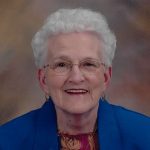Death of loved ones during pandemic can leave grieving families feeling ‘in limbo’

Family members guide a casket through a cemetery in this April 15 Catholic News Service photo. (CNS /Jim Urquhart, Reuters)
“A private graveside service is planned. A memorial Mass will take place at a later date.”
Some variation of those sentences has appeared in almost every Catholic obituary since COVID-19 directives were implemented in mid-March. Following are stories behind those words shared by readers of The Catholic Post. We deeply thank them for speaking with us during this difficult time, and invite prayers for all who are grieving the loss of loved ones as this period of isolation continues.
– – –
DIFFICULTY IN FINDING CLOSURE
“I feel like I’m in limbo, or purgatory or something.”
Mary Carrigan could be forgiven for using a different word to describe the lack of closure she’s feeling after the unexpected death of her son, Jacob Thompson, from a cardiac arrest on March 12 at the age of 34.
Yes, mid-March. Jacob died when life was changing for everyone as coronavirus restrictions began.
In her shock and grief, Mary began planning a visitation and funeral Mass at St. Ann Church in Peoria. A celebration of life luncheon was to follow at a karaoke bar in Bartonville. Jacob, a large man known as “Big Baby,” was an artist, photographer and songwriter who loved to sing at local clubs.
The luncheon was the first thing to cancel as restaurants were closed. In the coming days, the funeral Mass went from a 10-person maximum to being postponed.
“We had to let everyone know at the last minute,” said Mary, who said she has rewritten her son’s online obituary four times.
A memorial Mass and gathering will take place sometime in the future. But as the end of April neared, Mary’s dining room table was still covered with photos to place on picture boards for the visitation.
“Normally within a week that part is closed and you can move on with the grieving process,” she told The Catholic Post. But with a memorial Mass and gathering still to take place on a date yet to be determined, Mary said “I’m having a hard time with closure, moving on, and accepting the fact that he died at such a young age.”
She points to a “double-whammy.” Jacob’s son — a boy who looks like a young Jacob and lives with his mother in Canton — can’t visit his grandmother in Washington because of coronavirus fears.
“When I see his little face (on screens) I just want to hug him,” said Mary.
– – –
A SMALL TOWN SAYS GOODBYE
The town of Elmwood came through for Liz Powers.
After Maude Elizabeth Powers died on March 28 at the age of 93, only graveside services were allowed with 10 immediate family members present. Father Joseph Dondanville, pastor of St. Patrick Parish in Elmwood, presided.
The procession from the funeral home to the cemetery was a different matter.
Relatives and friends were socially distanced outside the Powers’ house. The next stop was a school where Liz had served as “lunch lady” for many years. Workers were there to wave goodbye.
Continuing past Elmwood Locker, where she had worked with her husband for many years and is now run by her son, John, there were more people in prayer. More family and friends were present at the cemetery, watching from behind a fence.
“It was very heartwarming and quite an honor,” said Liz’s daughter-in-law, Sue Powers of Yates City. “Only those of us who live in a small town could see this,” she wrote in a letter to thank friends and neighbors.
– – –
MISSED THE HUGS, CONDOLENCES
Mary Grace Schneider, whose family story is told here, shared a similar experience following the death of her father-in-law, Robert H. Schneider, in rural Nebraska on April 22 at age 85.
“He was a pillar of that community in the sandhills of Nebraska,” she said Mr. Schneider. “He would help anyone out, do anything for anyone.”
Many walked, one by one, past the casket in front of the altar at his parish church as immediate family members looked on from a side aisle.
“People were waving. That’s all they could do for condolences,” said Grace.
“One of the most healing aspects of a funeral is being able to reminisce about old stories, hearing about how much your loved one meant to people. Getting the hugs and condolences,” she said. Even friends dropping off food for her mother-in-law couldn’t come in the house because, at age 80, she fears contracting the virus.
But, as in the Elmwood story above, the area residents did what they could.
That included more than 30 flag-carrying motorcycle riders leading the procession to the cemetery I honor of the armed services veteran. At the cemetery, more than 200 people stood in a huge, socially distanced ring outside the gravesite.
“It was touching and meaningful,” said Grace.
– – –
ADVICE: MAKE THE CALL, DON’T FEAR TEARS
When the Benedictine monks of St. Bede Abbey said goodbye last month to Brother George Matsuoka, who died at age 98, they were able to gather as a community for a funeral Mass because the monks live together at the abbey.
“What we really missed, and what we really felt sad about, was the other people who couldn’t be there to celebrate with us,” said Abbot Philip Davey, OSB. Hundreds watched the funeral for the beloved figure from St. Bede online (see obituary and funeral homily in our April 26 edition), and an open-invitation celebration will take place at a later date.
Abbot Philip shared advice on how to share grief and comfort in this time of isolation.
“I think the most natural thing in the world is to simply call your friends and talk,” he told The Catholic Post. “You don’t have to make it all about the person that died, but just talk and say what you want to say — laugh and even cry together.”
Don’t fear the tears, said Abbot Philip. Make the call to ask how they are feeling and if there is anything you can do.
“”In a sense, give people an ability to talk and cry,” said Abbot Philip. The tears are a sign of love.
“They’re saying to the person they lost, ‘I love you,’ he said.









